Unit1It'sthelastdaybeforethenewschoolyearbegins.
- 格式:ppt
- 大小:1.33 MB
- 文档页数:19
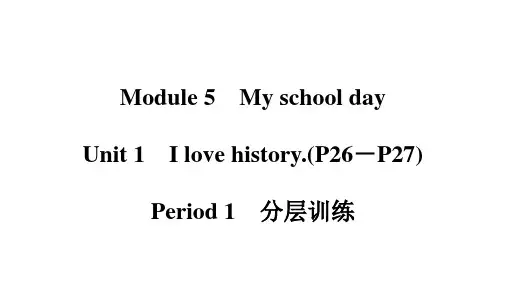
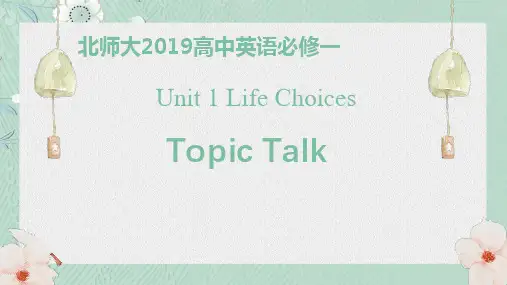
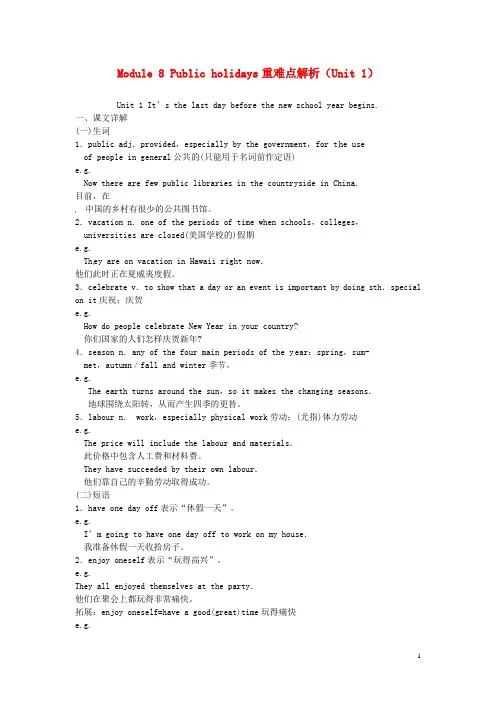
Module 8 Public holidays重难点解析(Unit 1)Unit 1 It’s the last day before the new school year begins.一、课文详解(一)生词1.public adj.provided,especially by the government,for t he useof people in general公共的(只能用于名词前作定语)e.g.Now there are few public libraries in the countryside in China.目前,在中国的乡村有很少的公共图书馆。
2.vacation n.one of the periods of time when schools,colleges,universities are closed(美国学校的)假期e.g.Th ey are on vacation in Hawaii right now.他们此时正在夏威夷度假。
3.celebrate v.to show that a day or an event is important by doing sth.special on it庆祝;庆贺e.g.How do people celebrate New Year in your country?你们国家的人们怎样庆贺新年?4.season n.any of the four main periods of the y ear:spring,sum-met,autumn/fall and winter季节。
e.g.The earth turns around the sun,so it makes the changing seasons.地球围绕太阳转,从而产生四季的更替。
5.labour n. work,especially physical work劳动;(尤指)体力劳动e.g.The price will include the labour and materials.此价格中包含人工费和材料费。
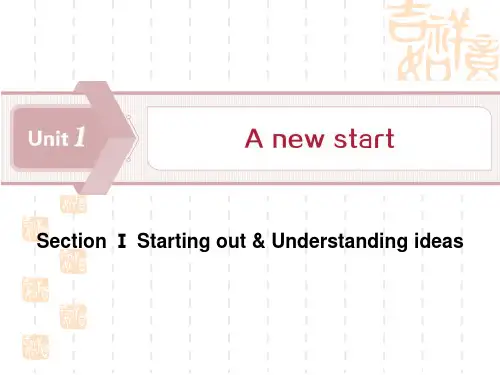
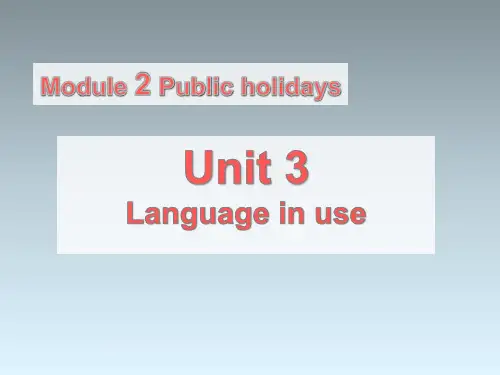
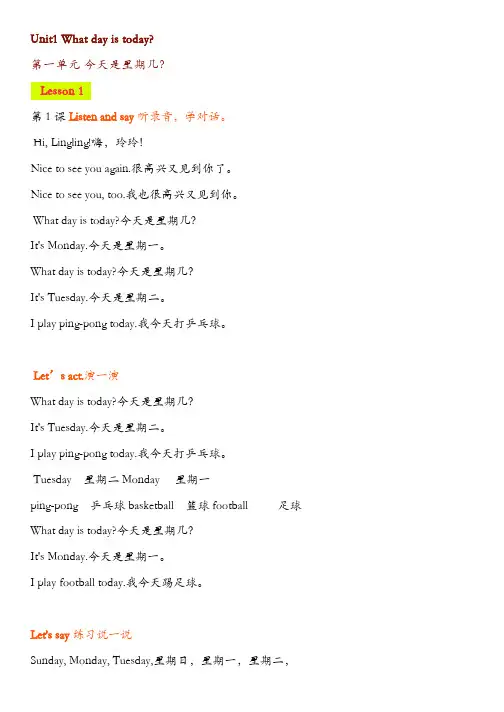
Unit1 What day is today?
第一单元今天是星期几?
Lesson 1
第1课Listen and say听录音,学对话。
Hi, Lingling!嗨,玲玲!
Nice to see you again.很高兴又见到你了。
Nice to see you, too.我也很高兴又见到你。
What day is today?今天是星期几?
It's Monday.今天是星期一。
What day is today?今天是星期几?
It's Tuesday.今天是星期二。
I play ping-pong today.我今天打乒乓球。
Let’s act.演一演
What day is today?今天是星期几?
It's Tuesday.今天是星期二。
I play ping-pong today.我今天打乒乓球。
Tuesday 星期二Monday 星期一
ping-pong 乒乓球basketball 篮球football 足球What day is today?今天是星期几?
It's Monday.今天是星期一。
I play football today.我今天踢足球。
Let's say练习说一说
Sunday, Monday, Tuesday,星期日,星期一,星期二,
Wednesday is the next day.接下来是星期三。
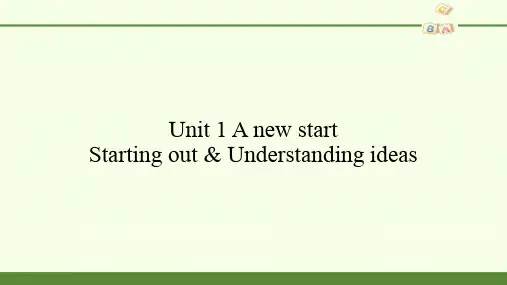
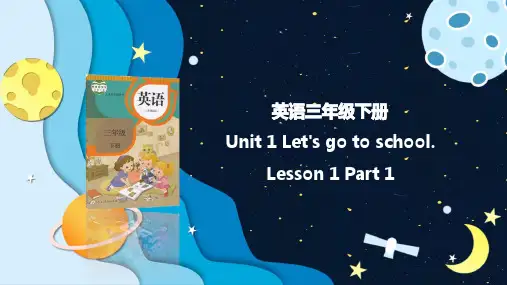
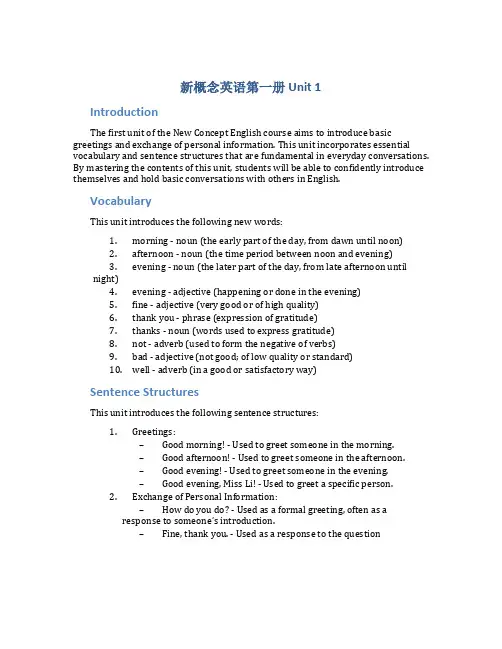
新概念英语第一册 Unit 1IntroductionThe first unit of the New Concept English course aims to introduce basic greetings and exchange of personal information. This unit incorporates essential vocabulary and sentence structures that are fundamental in everyday conversations. By mastering the contents of this unit, students will be able to confidently introduce themselves and hold basic conversations with others in English.VocabularyThis unit introduces the following new words:1.morning - noun (the early part of the day, from dawn until noon)2.afternoon - noun (the time period between noon and evening)3.evening - noun (the later part of the day, from late afternoon untilnight)4.evening - adjective (happening or done in the evening)5.fine - adjective (very good or of high quality)6.thank you - phrase (expression of gratitude)7.thanks - noun (words used to express gratitude)8.not - adverb (used to form the negative of verbs)9.bad - adjective (not good; of low quality or standard)10.well - adverb (in a good or satisfactory way)Sentence StructuresThis unit introduces the following sentence structures:1.Greetings:–Good morning! - Used to greet someone in the morning.–Good afternoon! - Used to greet someone in the afternoon.–Good evening! - Used to greet someone in the evening.–Good evening, Miss Li! - Used to greet a specific person.2.Exchange of Personal Information:–How do you do? - Used as a formal greeting, often as aresponse to someone’s introduction.–Fine, thank you. - Used as a response to the question。
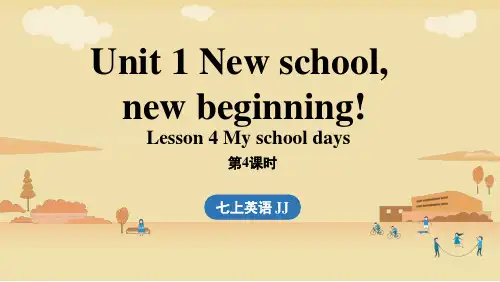

The first day of schoolBy Karl KrahnkeI have been teaching for seventeen years now. For the last three years I have been teaching the second grade at Washington Elementary School. Most of what happens on the first day of school every year is not new for me because I have been doing it for too long. But I still approach each new school year differently.One way that each year is different is that I always hope that each year’s new stude nts will be different. I hope that this year’s students will be smarter, better behaved, and more ready to settle down and start acting as though they are in school and not on vacation. I also hope that the new students will not cry, will have their lunch money, and will know what bus they are supposed to take to get home or whether their parents will be picking them up.Another way I hope new school years will be different is that I hope I will be better prepared. I know that I have started school years before, so I should be ready to help the students organize their supplies and put them in the blue and red storage boxes at the back of the room. I should be ready for the children to get tired and start to fall asleep by two o’clock in the long afternoon. I should be ready to check that the students can write their names and can recognize their names when they see them.But I am always surprised at the beginning of school. This year, for example, I had twenty-three new students. On the first day, six of them had forgotten to bring lunch money and did not have lunches of their own. I had to lend them money so they could eat in the cafeteria. Most of them knew how to get back home, but one little boy, Manfred, got on the wrong bus, and I had to pick him up and drive him home. He cried all the way.I was also surprised this year when three of the students did not seem to be able to read, and one of them would not write her name. I had given them easy books to read after lunch, while I was trying to make up some lists of students’ names for the office. I noticed that three children were looking at the pictures in the book but not at the writing. I stopped and asked them what they were reading, but they did not seem to know. I hope that they were just confused and afraid on the first day of school and that they will be able to read along with the other children.In general, though, the first day of school is an exciting one, for the children and for me. They are excited to get away from home and to be with a lot of other children their age. They look forward to the new year in school and askme a lot of questions about what we will do during the year. I am excited because I have a new group of students to teach, and I look forward to watching them learn writing, mathematics, and information about the community and the world they live in. Although it is sometimes difficult, it is very satisfying to be a teacher and to know that I am helping so many children become useful and educated adults.Exercise AReading carefully the following set of statements about the passage. Write Y (for yes) in the space if the statement agrees with the information given in the passage; Write N (for No) if the statement contradicts the information given in the passage; Write NG (for Not Given) if the information is not given in the passage.1.As an experienced teacher, he deals with each new school yearin more or less the same way, for whatever happens on the firstday of school is nothing new to him.2.The teacher hopes that each year’s new students will be brighter,better behaved, and more ready for the new semester.3.Always taking good care of students, the teacher is quite popularamong the students and their parents.Exercise BComplete each of the following sentences by either making thebest choice or filling in the blank with suitable words on yourown.4.In general, the first day of school is__both for the children andteachers.A)Challenging B) Scaring C) Exciting D) Amusing5.On the first day of school the author is intending to do all thefollowing EXCEPT that__A)He will see to it that the students can write and recognizetheir names.B)He will help the students organize their supplies and putthem in their respective lockers.C)He will drive those students home whose parents do not tocome to pick them up.D)He will help the students settle down for the new school year.6.To the author, it is very satisfying to be a teacher because youcan__A)Help the students learn more about the world they live in.B)Watch the children learning reading, writing andmathematics.C)Help children grow into useful educated people.D)All of the above.7.It can be inferred from the passage that__A)A few students are not well prepared for the new school yearafter the long vacation.B)The author is certain that some pupils in his class have specialdifficulty in reading.C)Many parents forgot to give their children lunch money onthe first day of school.D)Quite a few children are scared on the first day of school.8.The author seems to be a devoted primary school teacherwith__ behind him.9.As an educator, the author cares as much about the pupils’__astheir__.10.T he author believes that each child is special in that__.。
【进门测试】按要求完成句子。
(每题1分,共5分)1.Jim would like to see a new film. (同义句)Jim __________to see a new film.2.Helen should listen to the teachers in class.(改为否定句)Helen ____________listen to the teachers in class.3.His brother goes to work by bus.(对划线部分提问)___________does his brother ___________ to work?4.help, Yang Ling, the, asks, policeman ,for (.)______________________________________________________1.wants2.shouldn’t3.How go4.Yang Ling asks the policeman for help.【多元导学】当天气晴朗的时候,你们一般喜欢做什么?当下雨的时候,你们又喜欢做什么呢?答案:walk through the city;go through the forest;The river runs through our town.复习:方位介词【知识梳理5】多漂亮的衣服啊!这句为感叹句,感叹句是英语的一种句型,用来表示人的强烈感情。
一般来说,感叹句是由“what”和”how”开头的,句末用感叹号,朗读时为降调。
答案:What beautiful clothes!Unit2 重难点解析【知识梳理1】晴朗的【形容词】【名词】有风的【形容词】【名词】多云的【形容词】【名词】多雨的【形容词】【名词】【动词】【巩固练习】1.It was in the afternoon, but now it is .下午天气还是多云的,但是现在晴朗了。